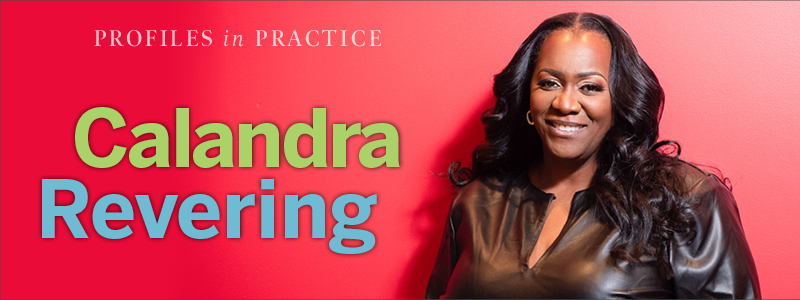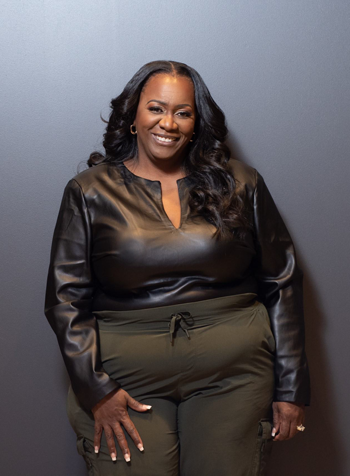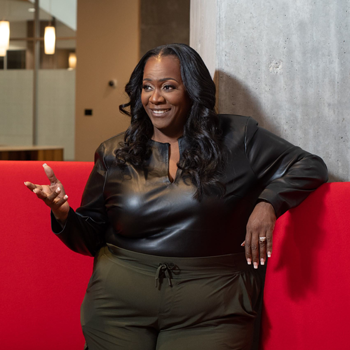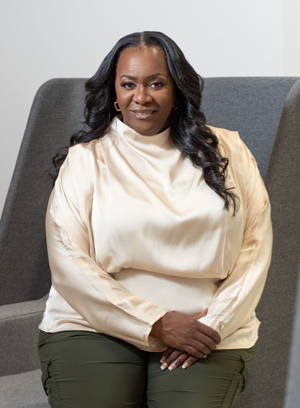 Calandra Revering’s journey to the practice of law does not fit into any rote narrative. In fact, her special gift is to create a new narrative for herself. She imagines herself in new places and forges her dream into reality. Popular culture has hijacked the word “manifest,” but it fits Revering’s life. Without role models or examples in the media, Revering manifested her life as a Black female attorney.
Calandra Revering’s journey to the practice of law does not fit into any rote narrative. In fact, her special gift is to create a new narrative for herself. She imagines herself in new places and forges her dream into reality. Popular culture has hijacked the word “manifest,” but it fits Revering’s life. Without role models or examples in the media, Revering manifested her life as a Black female attorney.
Revering’s power and momentum is generational. Her great-grandmother, Irene, escaped slavery and rape with a baby on her hip. Her paternal grandmother, Corine, survived marriage at age 14 and raised five children, while her maternal grandmother, Arleava, also married young, but lost five children in a fire. At the age of five, Calandra’s mother, Deloris, moved her two young daughters cross country from Wisconsin to the west Coast. She landed in Las Vegas, dealing blackjack at a casino and providing for her family.
As a teen, Revering decided to move back to Milwaukee, Wisconsin and live with her father, grandmother and great-grandmother after years of living in Las Vegas with her mother. Her grandmother often recalled stories about growing up during Jim Crow and life in Selma, Alabama. Summers were spent in Mobile and Birmingham, Alabama on the family farms, learning about the family history. Her grandmother took her across the bridge where Martin Luther King, Jr. once marched, and talked about the importance of a college education—something once denied to Black people.
father, grandmother and great-grandmother after years of living in Las Vegas with her mother. Her grandmother often recalled stories about growing up during Jim Crow and life in Selma, Alabama. Summers were spent in Mobile and Birmingham, Alabama on the family farms, learning about the family history. Her grandmother took her across the bridge where Martin Luther King, Jr. once marched, and talked about the importance of a college education—something once denied to Black people.
When Revering became a single mother at 19, having her son motivated her to earn a college degree and move out of Milwaukee. Flipping textbook pages with one hand and holding her baby’s bottle at night with the other, Revering finished her bachelor’s degree. Throughout her collegiate studies, Revering survived on food stamps and welfare.
She was determined to provide an exciting future for herself and her son. Revering recalled reading Ernest Hemingway in college and his accounts of travel. She longed to see more of the world. And after earning a minor in Africology, she learned even more about Black history, and attained more strength to continue her path to become an attorney. Determination and vision guided her out of the 53206—the ZIP code that incarcerates the highest percentage of Black men in America. (Revering recommends the documentary Milwaukee 53206 for an in-depth perspective on the community.) She told me that if she had stayed in her Milwaukee neighborhood after college, she knew that she would “never leave.”
 Revering focused on her goal to be an attorney. She saved her earned wages during college for law school applications and admission exams. Growing up, she watched shows like Matlock, “wondering why there were no Black attorneys,” and eventually decided that she would be the Black attorney. She saw herself where others said that she did not belong, and she focused her applications on law schools that would get her out of Milwaukee.
Revering focused on her goal to be an attorney. She saved her earned wages during college for law school applications and admission exams. Growing up, she watched shows like Matlock, “wondering why there were no Black attorneys,” and eventually decided that she would be the Black attorney. She saw herself where others said that she did not belong, and she focused her applications on law schools that would get her out of Milwaukee.
Revering’s success has not come easily. In addition to the obvious challenges of single parenthood and poverty, racism constantly created additional roadblocks. Revering graciously and generously shared with me various experiences of racism throughout her life and career. Her stories illuminated how she has been forced to exert extra energy to “prove” that she can practice law, an unfortunate reality of being Black in a profession dominated by non-minorities.
For example, Revering explained that people see “her color first, her sex second.” In court, she—like many other Black attorneys—has been mistaken as the defendant, or the girlfriend of the defendant, then maybe the probation officer. Because of this, she had to “earn” respect as an attorney in ways that white attorneys did not, one trial at a time. Her credentials have been challenged in every sphere. As a newly licensed attorney in 2002, a judge pointedly questioned her in open court during her first time on trial call. The judge first asked if she was the defendant. When she replied that she was the attorney, the judge asked if Revering was a “real attorney,” and if she had passed the bar. Unwavering in her purpose, she won her first jury trial.
This experience was not a “one-off.” She told me about racist incidents across the board: with juries, venire panels, judges, bailiffs, opposing counsel, opposing parties. Revering’s credentials were questioned early in her career, especially for cases with the most serious criminal matters, and she had to prove she could try a case. She describes being a Black attorney in Minnesota some days in one word: trauma. Throughout these challenges her response was the same: she knows her personal and professional worth. She refused, and refuses, to let the ignorance and doubt of others change her opinion of herself. Today, after 20 years in the game and a familiar face in the courtroom, she needs to prove nothing.
As an attorney who primarily practices family law and criminal defense, she seeks to reconcile wrongs within the community and advocate for justice.
Revering manifested—and continues to manifest—many of her goals. She earned her bachelor’s degree from University of Wisconsin Milwaukee, then her juris doctorate from William Mitchell Law School. As an attorney who primarily practices family law and criminal defense, she seeks to reconcile wrongs within the community and advocate for justice. Revering knows first-hand the difficulties of growing up around crime. Now that she is married, with two bonus daughters and three beautiful grandchildren, she truly understands the challenges of blending a family. Her clients appreciate her wisdom, tenacity, and willingness to listen. Her son is her greatest supporter, and she helps him in his advocacy for the LGBTQ community. He is quite the fighter—like his mom.
tenacity, and willingness to listen. Her son is her greatest supporter, and she helps him in his advocacy for the LGBTQ community. He is quite the fighter—like his mom.
Revering continues to create in the profession. Her practice has expanded to include mediation, consulting, and municipal investigations. Although she was not elected, she ran for a judgeship in Ramsey County in 2018. She is also featured in the Minnesota documentary series, And Justice For All. Now, she’s writing a book—a memoir called, Sustained. Even after 20 years of practice, she continues to provide mentorship to young adults and attorneys. “For others, I try to be the person who I wished would have been there for me,” she explained.
Even though she has accomplished so much, and with an even brighter future ahead, Revering says she still fights the negative voices in her head every day. She knows that she must help Black women and men fight those same voices, along with the microaggressions in the workplace and the many challenges of practicing law. Each one of us can choose to be strong, and each one of us can choose to benefit the community as we find our vocations in life. Revering does both.
 Claire Bruner-Wiltse
Claire Bruner-Wiltse
A graduate of Saint Louis University School of Law, Claire Bruner-Wiltse practiced plaintiffs’ employment law in St. Louis, Missouri before moving to Minnesota in 2022. Claire heads the employment law practice at Heimerl & Lammers.